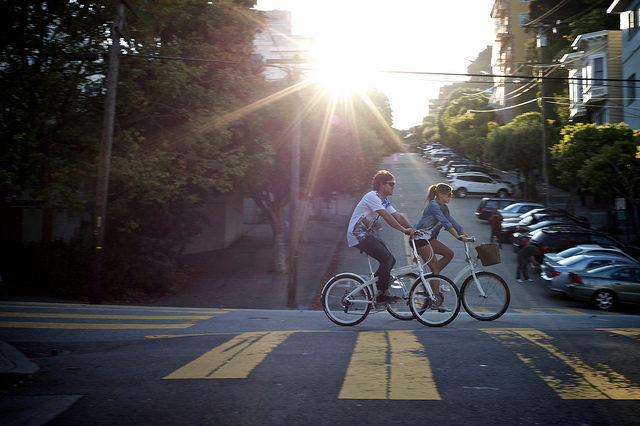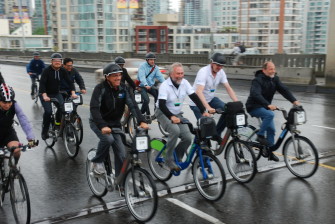
Wrapping it up: The last two days at Velo-city
Last week, more than 800 cycling-minded participants landed in Vancouver, British Columbia to exchange ideas, resources, and strategies at the Velo-city conference. Couldn’t make it, but want to know what took place during this unique event? Read on for some key highlights and memorable moments from Velo-city Vancouver.
Over past little while, cycling – whether as a form of exercise, solution to commuting, or leisurely activity – has gained considerable popularity in North America. With more and more people hopping on bikes to get to where they’re going, a key issue has become how to make cycling accessible and safe.
ECF’s Kevin Mayne brought this issue to light in his speech on 30km/hr zones in his presentation at Velo-city. Stating that the very existence of the 30km/hr zone changes the perception of transport, and the level of safety associated with it, Mayne articulated that this affects “whether parents allow their kids to cross the road, play outside…”
Adding to this vision of safe and accessible cities, Paul Tranter, professor of human geography at UNSW asserted in his presentation that creating cycle-friendly cities for citizens today will produce great benefits to children, today and in the future. A very well-received presentation, Tranter was praised by many, including Randy Rzewnicki of ECF, who said that Tranter's presentation made it clear that "we've got some work to do to make sure that our public spaces are safe for kids." And we should be up to the task, because, as Tranter states:
“Creating cycle-friendly cities” Tranter stated, “It’s child play.”
Of course, money plays a big role in creating things such as 30km/hr zones and other aspects of safe spaces for cyclists and children. Bringing this issue to the surface, SRAM's Randy Neufeld highlighted the “U.S. Paradox” in his presentation, describing it as the situation where cycling has gained considerable momentum in the U.S., but the federal government “attacks funding for bicycle infrastructure.”
Fiona Campbell further stressed the difficulties associated with “selling” the idea of cycling. Hailing from Sydney Australia, Campbell made a clear and memorable statement in her lecture that “convincing the politicians who are car drivers is the difficult thing.”
Difficult as that may be, there are already a few people who are certainly convinced of the benefits and bright future of cycling. One of them is aforementioned, Randy Neufeld, Director of SRAM Cycling Fund and long-time cycling advocate. During the conference, Neufeld gladly accepted the Bicycle Personality of 2012 award from the Cycling Embassy of Denmark.
Speaking of those bike-loving Danes, Troels Andersen of Fredericia, Denmark rolled in to Velo-city on Thursday, to showcase Bike Score, a new initiative aimed at increasing ridership, by monitoring how much people cycle, and providing rewards based on the results.
Where does the enthusiasm for this project come from? Andersen put it frankly and simply: “There’s nobody in Denmark who can say they’re not a cyclist. The question is rather, when was the last time they were on a bike and for how long.”
While the Danish cycling culture is still in the making in Vancouver, Velo-city had managed to act as a platform for showcasing cycling’s many benefits to our lives, in various forms. Randy Rzewnicki of ECF mentions one of these, stating that "approximately 1/4 families in Copenhagen have cargobikes", suggesting that the future of transport is certainly taking a bike-friendly turn. Aside from getting us where we need to be quickly and cost-effectively, the International Transportation Forum (ITF) firmly stated at Velo-city that “the positive heath impacts of cycling far outweigh the negative health impacts.”
So not only can pedaling on a bike get us to school, work, or to dinner with friends, but it’ll also make us healthier and happier as a whole – something that everyone, the world around, is entitled to. In this respect, Velo-city also practiced what it preached, as described through a favorite experience in Vancouver, by Programme Greenways' Daniel Mourek:
“We got some exercise during the Bicycle Parade by cycling through downtown Vancouver; and after that we cycled some more with a group of folks from UBC, to Kits for dinner! The view from the Vancouver Skyline from Burrard bridge – which has seen 1 million cyclist this year, alone – is astonishing!”
Coming to a memorable close on Friday, the ECF’s Berhard Ensink brought forth the Charter of Vancouver, underlining cycling as a universal right, and one that is particularly pertinent for children.
Highlighting this belief in the crucial connection between children and cycling, Paul Tranter asserted this point during his presentation that, “if we get it right for cycling, we get it right for children.”
ECF's Manfed Neun also affirmed his belief in the essential nature of childrens’ right to cycle, and the Charter of Vancouver, with a very succinct and clear statement, that what we need is: “more kids cycling more often”.
Velo-city managed to showcase this attitude though presentations, displays, information and resource sharing sessions, and many other activities. However, what sticks out as memorable for many people about Vancouver's Velo-city was the sentiment of it all.
Kevin Mayne of ECF couldn’t have said it better when he talked about his favorite memory of Velo-city:
“People came from everywhere to discuss their passion for cycling.” And that passion and desire to create lasting positive change for today’s and tomorrow’s generations, was definitely in the Vancouver air at Velo-city 2012.
About the Author
 Alexandra Cutean is the Communications Assistant at ECF and a long-time cyclist. With a background in conflict resolution and European Affairs, she spends most of her spare time looking for new places to visit, and mapping out bike routes.
Alexandra Cutean is the Communications Assistant at ECF and a long-time cyclist. With a background in conflict resolution and European Affairs, she spends most of her spare time looking for new places to visit, and mapping out bike routes.
Contact the author
Recent news!
Upcoming events
Contact Us
Avenue des Arts, 7-8
Postal address: Rue de la Charité, 22
1210 Brussels, Belgium












